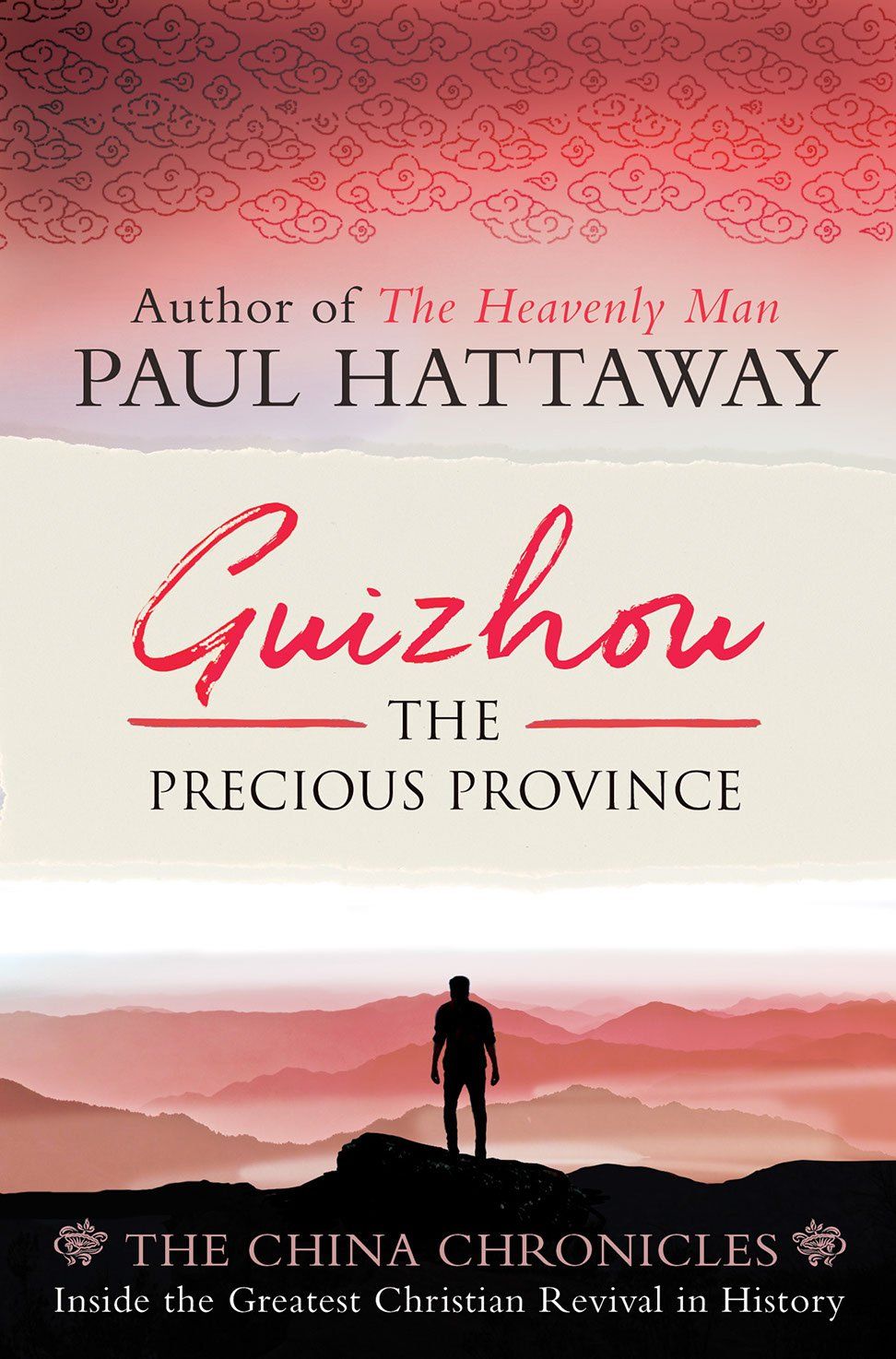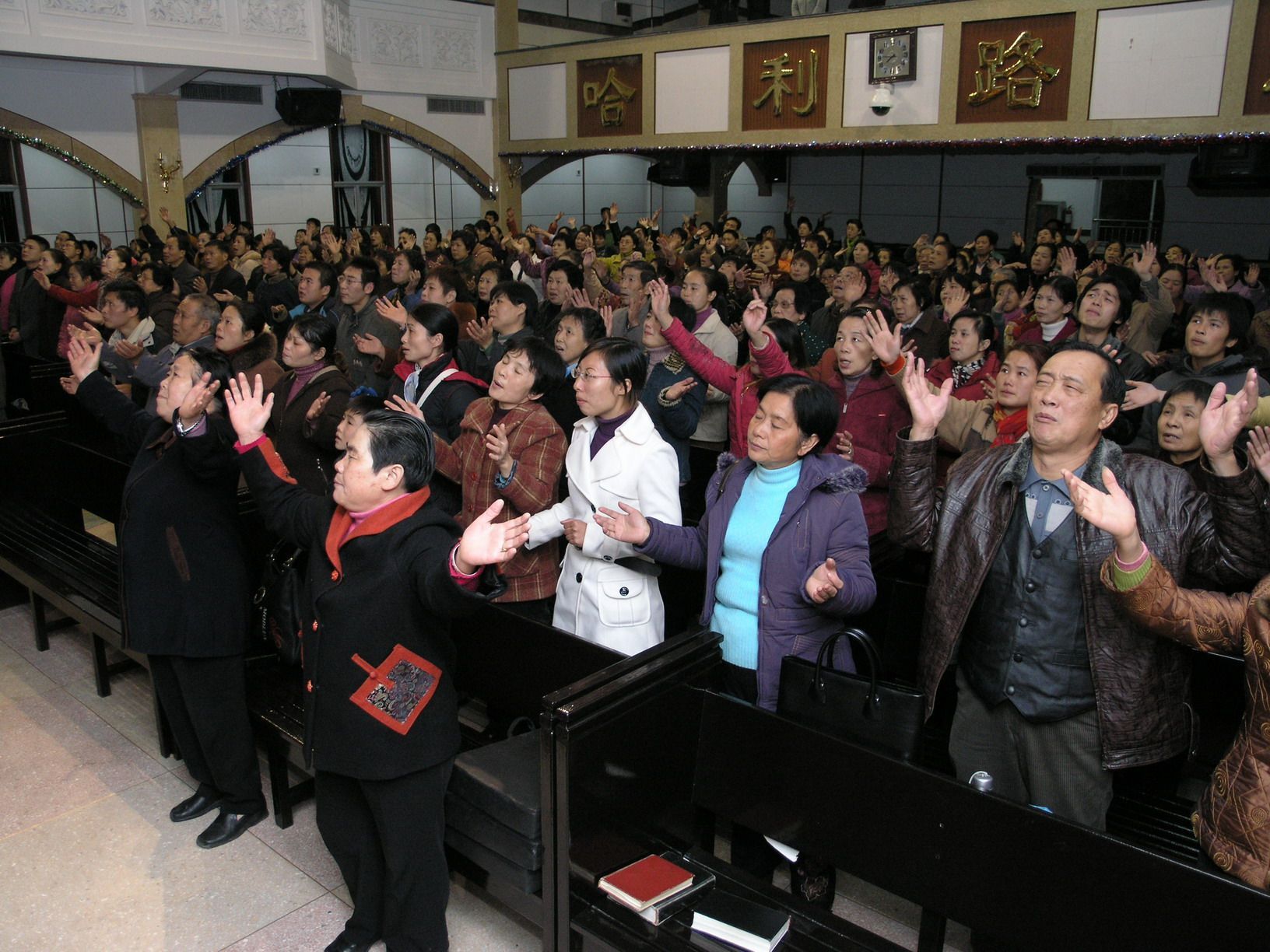1950s & 1960s
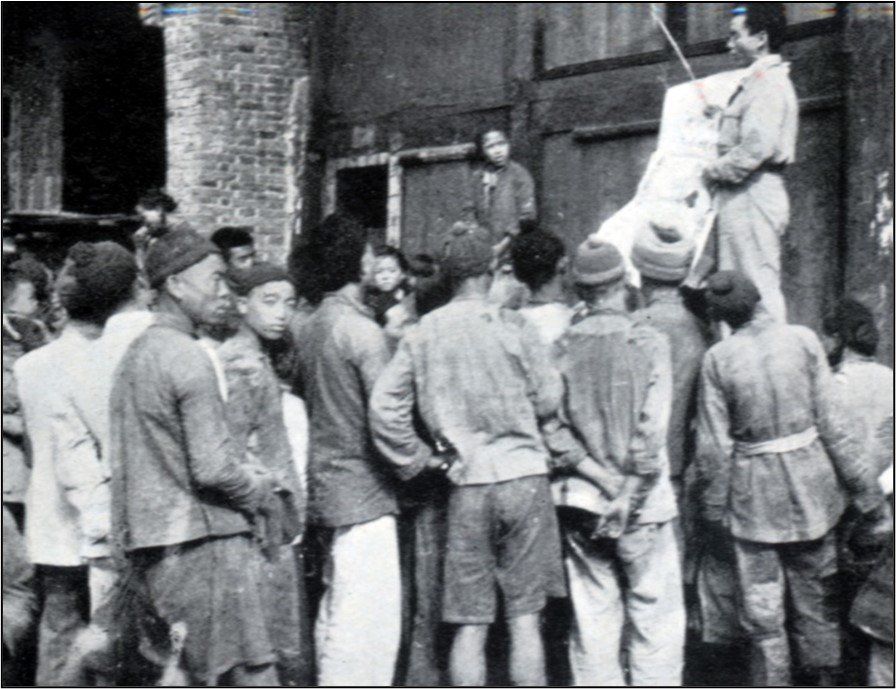
A Chinese street preacher in the early 1950s.
The People's Republic of China was established on October 1, 1949, and the 1950s commenced with great uncertainty for the Church in Guizhou. Whereas in other parts of China some Christians expected the new government to usher in an era of freedom, few church leaders in Guizhou held such hopes. The province had already spent two decades being torn apart by the Communists, and their brutal suppression of the body of Christ promised a grim future now that they had control of the whole country.
Before the decade got underway, however, God opened a window of blessing for a short time. As the sun was setting on the era of foreign missionaries in China, Leslie Lyall was involved with large evangelistic youth rallies in Guizhou, which saw unprecedented openness to the gospel. He wrote, "No one had ever seen the like. In two centers in Guizhou, an open-air campaign resulted in 220,000 people hearing the gospel in the course of 57 hours of preaching. In one meeting, 5,000 people stood in the rain for three hours listening intently."
Looking back, this brief time of blessing may have been God anointing His Church in Guizhou for burial. The unexpected visitation from heaven helped fortify many for the trials that lay ahead. The impact of the meetings reverberated, and growth was experienced among the Chinese churches throughout the province. At Zunyi, the Christians had been deeply discouraged by their lack of progress. There was disunity among the believers, and many hidden sins in the congregation had grieved the Holy Spirit and prevented Him from blessing their work. The church reached its lowest point in 1950, causing some members to cry out to the living God for deliverance and mercy. Later that year, missionary Margery Sykes wrote from Zunyi:
"We did nothing but pray, and love them with His love, and the Lord did all the rest.... Real unity now exists among the church leaders.... The result is spiritual blessing of the first order. Once again folk are coming in and getting saved, and the 37 new believers baptized in September are going right on with the Lord."
The Bosshardts' Return
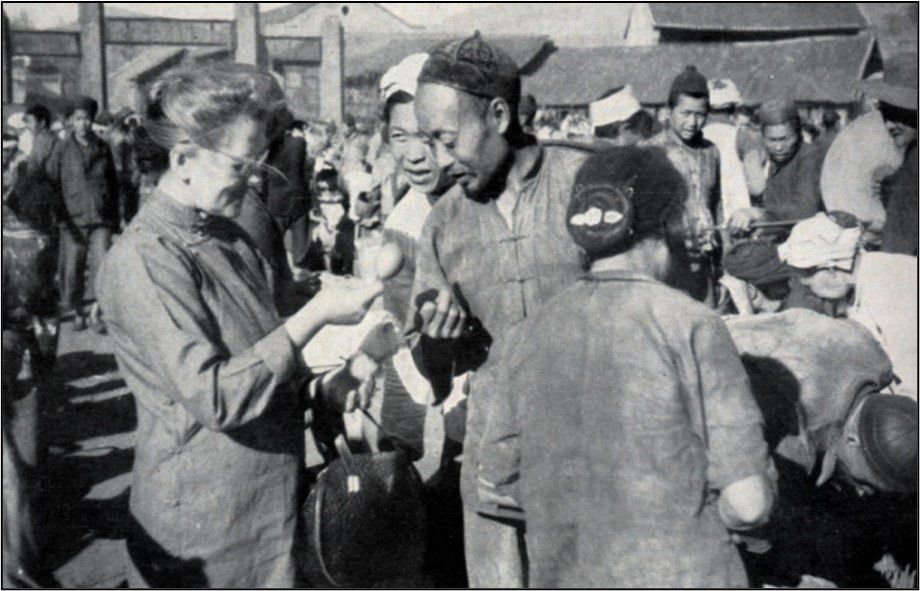
Rose Bosshardt in the marketplace at Panxian.
Many foreign missionaries had already left Guizhou by the start of the decade, and most of those who remained were arrested in 1950 or 1951 and expelled from China.
After the Swiss missionary Rudolf Bosshardt survived 560 days in Communist captivity from 1934 to 1936, many assumed he and his wife Rose would quietly retire to their homeland. The Bosshardts were made of tough material, however, and after a time of recovery and sharing their testimony throughout Europe, they returned to Guizhou in 1940, and continued the work God had called them to.
The Bosshardts were highly respected, and many people were attracted to them and their message of the Savior. A small team of local Christians joined them, and the Holy Spirit pressed the needs of the unevangelized eastern districts of the province on their hearts. Rudolf had spent months walking through Hmu tribal areas during his captivity a decade earlier, and he retained a burning desire to one day return to reach them with the gospel.
A young Chinese missionary volunteered to make a journey throughout eastern Guizhou to survey the region. After weeks of traveling through the remote mountains, she gave this grim assessment: "In that area there are nearly 300 market towns and at least 600,000 people. So far as we know there is just one Protestant Christian there."
As militant Communism swept across China and Mao Zedong commenced his totalitarian rule as the country's leader, thousands of missionaries either willingly left China or were forcibly removed. The Bosshardts, however, knew how to endure great hardship, with Rudolf even having participated in the Red Army's Long March. They remained at their station in western Guizhou, courageously carrying on their work, even as the number of missionaries in China dwindled to just a tiny fraction of what it had previously been.
It is fitting that the last word on the foreign missionary era in Guizhou should come from the bold and persistent Bosshardts. In March 1951, with harsh persecution breaking out against believers everywhere, they filed their final report from Panxian, which told of a fresh receptivity among the people:
"The degree to which homes and hearts and open are ample justification for remaining on.... The friendliness of the people, of all classes, is most marked. Attendances at the meetings have been well maintained, though recently we have noted a falling off of outsiders. On the other hand, old enquirers are beginning to return again after a lapse, sometimes of years. The men's side of the work has been strengthened by the conversion of several mature, well-educated men. As we baptize in the river, generally before a tremendous crowd, this step means much for these men. Financially, at least at present, these additional members mean little to the church, for all the new members have fallen on lean days. It has been a great joy to see two or three making rapid progress spiritually. One man specially gives us great joy by the freshness of his testimony."
A short time later, Rudolf and Rose Bosshardt were also forced to leave China, and the curtain was abruptly drawn on the era of foreign missions, nearly 200 years after the first Catholics had arrived in the province.
Typically, the Bosshardts refused to give up. They relocated to the Southeast Asian country of Laos, where they preached the gospel among the Chinese community there for many years. Rose passed away in 1965, and Rudolf returned to England and settled in Manchester, where he founded the Manchester Chinese Christian Church. After a long and fruitful life dedicated to the service of Jesus Christ, Rudolf Bosshardt finally died in 1993, at the age of 96.
The Worst Persecution in Chinese History
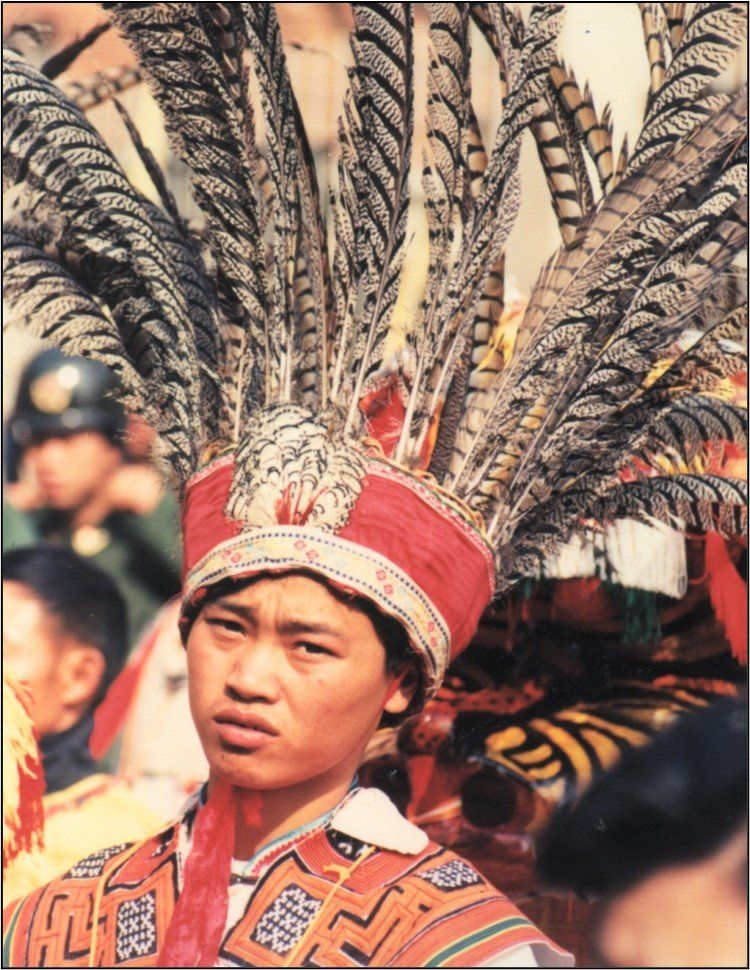
Christians from the Gha-Mu tribe were harshly persecuted in the 1950s and beyond. [Paul Hattaway]。
Once the foreigners had been removed, persecution against the local Christians in Guizhou was unleashed with full-force. Two pastors, Li Yuehan (John Lee) and Zhu Shiguang were arrested and mercilessly tortured. Their treatment was so severe that Li died in prison within a few weeks, while Zhu's mind snapped due to the inhumane abuse he received from the Communist tormentors, and he committed suicide in 1951.
The campaign of terror continued, and in the mid-1950s the senior A-Hmao church leader, Zhu Huanzhang, was attacked during the government's 'Campaign to root out Counter-Revolutionaries' because he refused to renounce his faith in Christ. Zhu was diabolically tortured and pushed beyond the point of no return, and was driven to commit suicide in 1956.
At this time, with all foreigners removed from Guizhou, a black curtain descended, and for many years little or no news emerged from the Christians in China's Precious Province. Nobody knew if the believers were being obliterated or were still meeting, and all that Christians around the world could do was pray and trust that the Heavenly Father was sustaining His children, and that the wonderful revivals that had swept so many thousands of people into His Kingdom would not go to waste.
The 1960s witnessed the worst persecution of Christians in Chinese history, especially during the decade-long Cultural Revolution which commenced in 1966. Church leaders were the hardest hit, with one survivor later describing the carnage:
"Thousands of pastors and devoted believers died because they stood firm in their faith. Additional thousands were sent to prison where they suffered various forms of torture, hard labor and starvation. The government of China gave an edict which stated that if anyone was found spreading the gospel, they would be thrown into prison or put to death. Everywhere, believers were watched and much more."
The cruel and creative methods used to torture and kill God's children during these dark years revealed the diabolic forces behind the evil acts. One pastor was arrested and severely tortured in an attempt to make him denounce Christ. When he steadfastly refused to do so,
"They became so angry with him that they brought a coffin and made him lie in it. They told him, 'All right, now you must make a final decision! Either deny Jesus Christ or we will bury you.' His only reply was, 'I will never deny my Lord.'
They nailed the coffin shut and left it sitting for a time, listening for a voice from the inside. There was none. They screamed and shouted at him and pounded on the casket. Still, only the sound of quiet, peaceful breathing. They buried him alive."
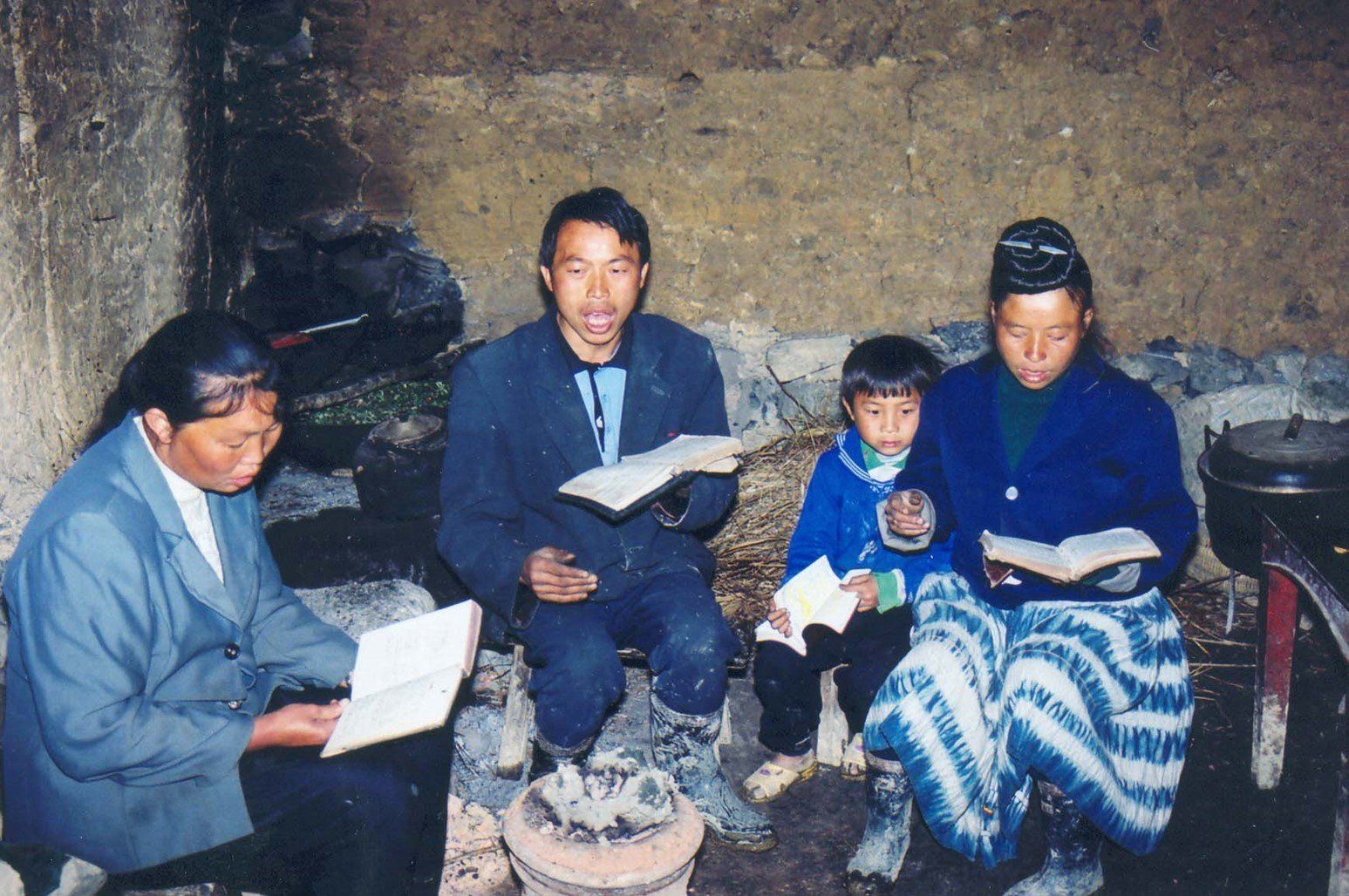
An A-Hmao family reading their treasured Bibles in Guizhou. [RCMI]
The massive growth of the Miao churches in Guizhou was well-known at the time, both in the Christian world and in Communist circles. Predictably, the tribal believers were targeted by the God-hating authorities, and numerous campaigns were launched in an attempt to 're-educate' the A-Hmao and Gha-Mu believers to stop them believing in 'superstition'.
The truth had been deposited deep within believers' hearts, however, and thousands of copies of the A-Hmao New Testament had been printed in 1937, 1947 and 1950. The precious Scriptures were spread over a wide area of Guizhou and Yunnan provinces just prior to the outbreak of persecution.
Believers in hundreds of villages now had cherished copies of God's Word, and they were determined not to lose them. During the worst of the anti-religious persecutions of the 1960s and 1970s, the A-Hmao hid their Bibles in obscure places, perhaps still motivated by the belief that they had once possessed a written language only to have lost it during a previous persecution.
Growth in the Midst of Adversity
Intense and sustained persecution was fully unleashed on the tribal churches in western Guizhou, and it was years before any news filtered from the isolated mountains to the outside world. One Chinese researcher summarized the experiences of Guizhou's tribal churches with these words:
"The Miao teacher Yang Zhicheng and 162 other evangelists and Christians were labelled a 'counter-revolutionary clique' and were wrongly sentenced to labor camps. In 1964, local cadres investigated one production brigade which had more than 100 Christians and decided the church had taken over power from the grass-roots Party organs. Suppression of religion redoubled. All the ordained preachers suffered restrictions, which gave independent evangelists their opportunity.
In 1965 in Weining there were at least 647 independent (house church) preachers—more than 20 times the number of those formerly appointed in the original church."
The continued growth of the tribal churches infuriated the Communist leaders, who were under pressure from Beijing to obliterate Christianity from the province. The launch of the Cultural Revolution in 1966 afforded an opportunity for the Communists to get rid of the Church once and for all, and nothing was held back. From the onset,
"All religious believers were labelled 'ghosts, snakes and monsters' and 'running dogs of the imperialists'. Some were forced to renounce their faith at special indoctrination sessions. In the Wumeng area alone, these sessions were held 18 times. Church buildings were confiscated and Bibles burnt.
When brute force didn't work, the government chose a new strategy to break the spirit of the tribal believers. In the village of Xiaoshiqiao ('Little Stone Bridge'), Christians were faced with a stark choice in 1969. They were told to choose between Jesus Christ and Chairman Mao, but warned that if they chose Christ they would face dire consequences. A local official announced, 'The land belongs to Mao. You cannot till it. The cattle belong to Mao. You cannot pasture them. Every blade of grass belongs to Mao.'"
Church leaders were dragged off to prison and endured unmentionable cruelties. Many were murdered or lost their minds due to the intensity of the torture they received. Those who remained in the villages were forced to give up their tiny plots of land, which provided their only source of food. Concerned relatives and Christian brothers and sisters from other villages smuggled food to them under the cover of darkness.
Despite the widespread and brutal persecution, faith in Jesus Christ could not be uprooted from the hearts of the thousands of A-Hmao, Gha-Mu, Nosu and other tribal believers. Though buffeted by the storm, they stood firm and refused to abandon the living God. They drew strength from the promises of the Bible, and the Second Coming of Christ was often taught to give hope to the discouraged and downtrodden saints.
By the end of the 1960s, the body of Christ in Guizhou was battered and bruised. Hundreds of pastors had been sent to prison labor camps where many perished and were never heard from again, but the Communists had failed in their attempts to wipe out Christianity. In fact, there were indications that the faith had continued to spread, and the number of believers throughout the province may have even increased by the supernatural hand of God!
© This article is an extract from Paul Hattaway's book 'Guizhou: The Precious Province'. You can order this or any of The China Chronicles books and e-books from our online bookstore.

